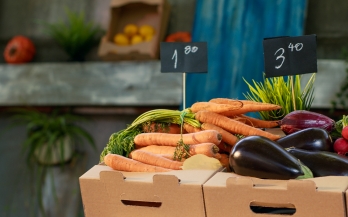


Quantifying the Socio-Economic Impacts of Food: A Review of True Cost Accounting Methods
- 15/12/2025
Global food systems generate significant socio-economic impacts (or externalities) – both positive and negative – which greatly vary across geographic regions, supply chains, and production systems.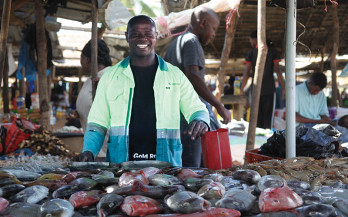
Belensesses Market — A Photo Story
In the heart of Nampula, an old market is shifting into something new and so are the lives within it. What began as an ordinary field visit became an unexpected turning point, captured through a lens that witnessed far more than change in bricks and sand. This photo story follows that quiet transformation: the people who have waited for it, the place that needed it, and the question that emerged and only later found its answer.
Harnessing AI to Transform the Fight Against Malnutrition
Billions of people worldwide are malnourished. Despite our best efforts, the cost of a healthy diet and food insecurity continue heading in the wrong direction. Without significant intervention, this crisis will persist—but we believe artificial intelligence (AI) represents a powerful new tool to help change that trajectory.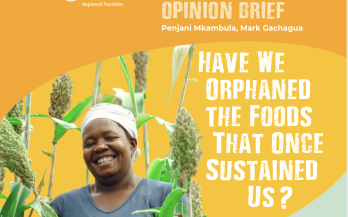
Have We Orphaned The Foods That Once Sustained Us
- 04/12/2025
Orphaned crops refer to a diverse group of foods, including cereals, legumes, vegetables, and fruits, that have been largely overlooked by mainstream agricultural research, breeding programs, and markets. Many orphan crops contain higher concentrations of vitamins, minerals, and protein than major cereals. In soci eties facing a double burden of undernutrition and rising diet-related diseases, orphaned crops provide a crucial bridge. They nourish without harming. Nutrition education in schools and public health programs can normalize the consumption of traditional foods, while media and culinary initiatives can make them fashionable. Changing perception is just as critical as changing production.
Shaping Food Culture Together: Lessons from Jakarta’s Walking Tour
Jakarta moves fast. So do its appetites. Over the past five years, Indonesia’s food landscape has shifted further towards convenience and high-risk options, moving away from diets that are nourishing and environmentally grounded. Indonesia Health Survey 2023 tells the story in numbers: high-fat foods consumption rose from 58.5% in 2018 to 60.7% in 2023; salty foods jumped from 40.3% to 52.2%; and instant noodles climbed from 45% to 51.7%. Meanwhile, adequate vegetable intake (five portions per day) fell from 4.6% to 3.3%.
Quantifying The Environmental Impacts of Food A Review of True Cost Accounting Methods
- 28/11/2025
Global food systems face complex, multi-faceted challenges that greatly vary by context, and their environmental, health, and socio-economic impacts are equally diverse. A comprehensive understanding that integrates these disparate factors into unified, clear guidance is essential for decision-making, including policy measures and industry practices.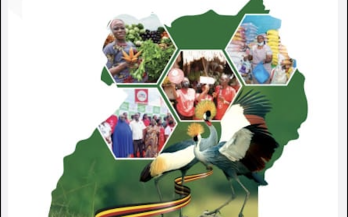
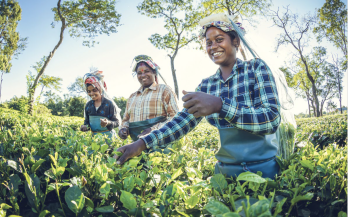
Territorial Governance and Food Markets for Sustainable Food Systems
- 21/11/2025
This White Paper makes the case for a territorial governance approach that reinforces urban–rural linkages by empowering local actors and enabling their collective agency. Local, traditional, and farmers markets serve as strategic hubs that offer multiple levers and diverse forms of capital for transforming food systems within cities, across urban–rural interfaces, and throughout wider territorial landscapes. Investing in both hard (physical) and soft (capacity-building) market infrastructure, supporting diverse knowledge systems, and advancing inclusive “whole-of-society” governance are essential steps toward unlocking resilient and sustainable food systems now and in the future. With these foundations in place, communities, governments, and sectors can routinely apply best practices and participate meaningfully in decision-making processes that foster a wide range of regenerative, biodiverse food value chains. Such systems create market and food environments characterized by vibrant public spaces; access to affordable, safe, culturally preferred, healthy diets; reduced and valorized food waste; and opportunities for dignified, prosperous livelihoods.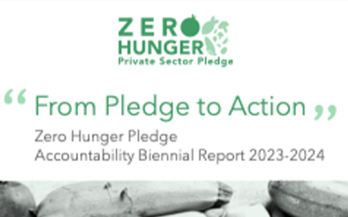
Zero Hunger Pledge Accountability Biennial Report 2023-2024
- 18/11/2025
Much of today’s headline news paint a grim picture — numerous crises unfolding alongside a sharp decline in global solidarity and the withdrawal of the private sector from net-zero commitments. The unity that inspired the 2030 Agenda for Sustainable Development a decade ago now feels increasingly distant. Yet, the embers of that spirit, which imbued the launch of the Zero Hunger Private Sector Pledge in 2021, remain.